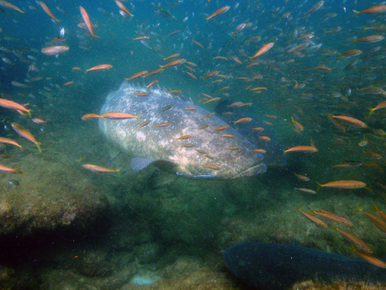Estuarine impacts in SE Florida: Determining the effects of changing resource management on Florida’s coastal coral reefs
|
|
Development of sound management strategies is critical for conserving and protecting vital coral reef communities in South Florida. This project specifically addresses the effects of management activities in the St. Lucie Estuary and the resulting water quality impacts on downstream coral and algal communities located on St. Lucie Reef. This reef is located within St. Lucie Inlet Preserve State Park and represents the known northern limit of many tropical benthic coral reef species. St. Lucie Reef serves as habitat for numerous fish and invertebrate species of both commercial and recreational importance.
|
In 2016 we expanded our approach to include reef sites in Martin and Palm Beach Counties. We have completed connectivity assessments for Montastraea cavernosa in the region and determined variability in coral gene expression associated with temporal changes. The overarching goal of this research is to provide data and information for enhanced adaptive management in ongoing and proposed regional restoration and conservation efforts including the Comprehensive Everglades Restoration Plan. This project also supports Harbor Branch efforts in the Indian River Lagoon Observatory.
 Goliath grouper spotted at St. Lucie Reef
Goliath grouper spotted at St. Lucie Reef
Partners: Florida Fish and Wildlife Conservation Commission (Jeff Beal), St. Lucie Inlet State Park, South Florida Water Management District, Southeast Florida Coral Reef Initiative, Florida Fish and Wildlife Research Institute
Funding: Florida Sea Grant, Florida State Wildlife Grant, FWC, Robertson Coral Reef Program, NOAA Coral Reef Conservation Program, Florida Department of Environmental Protection, Save Our Seas Specialty License Plate Program, River Branch Foundation
Funding: Florida Sea Grant, Florida State Wildlife Grant, FWC, Robertson Coral Reef Program, NOAA Coral Reef Conservation Program, Florida Department of Environmental Protection, Save Our Seas Specialty License Plate Program, River Branch Foundation
